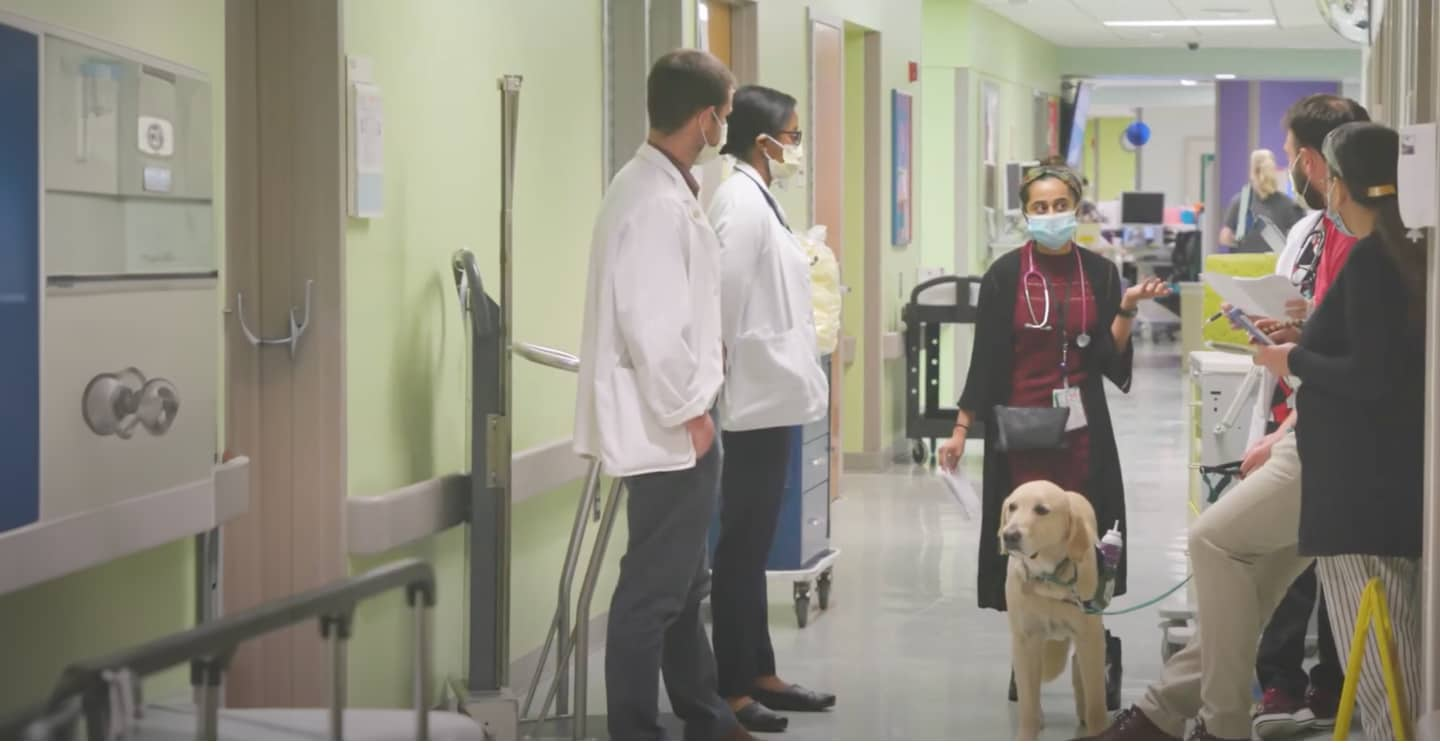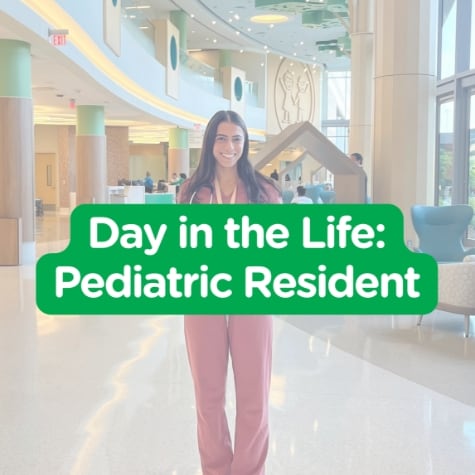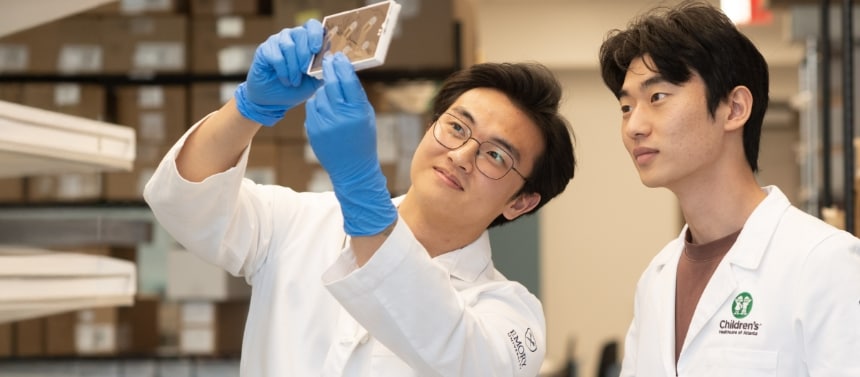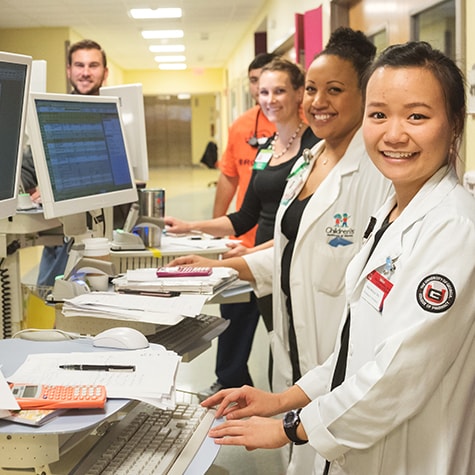
Physician Residencies and Fellowships
Children’s is one of the largest pediatric clinical care providers in the country, managing more than one million patient visits annually at multiple campuses across Atlanta, including three hospitals, Marcus Autism Center, the Center for Advanced Pediatrics, urgent care centers and neighborhood locations. While serving the wide array of populations at these locations, our teams are dedicated to shaping the future of healthcare by training the next generation of pediatricians and pediatric sub-specialists as well as providing a robust pediatric experience to adult-based program rotators. The excellent clinical environment, population diversity, and high volume of our clinical services, along with the research and scholarly expertise of our physicians, make Children’s one of the best healthcare systems in the nation to receive pediatric clinical training.
Our trainees are an integral part of our healthcare system, bringing a wealth of knowledge and clinical experience across accredited (ACGME, CODA, POSNA) and post-accreditation training programs. Children’s offers you the chance to build a stellar academic career through our partnerships with some of the best research and academic centers in the nation. We work with the following neighboring institutions to develop cutting-edge treatments and technologies to answer the most perplexing childhood medical questions:
- Emory University School of Medicine
- Emory University Rollins School of Public Health
- Georgia Institute of Technology
- Morehouse School of Medicine
- Centers for Disease Control and Prevention (CDC)
At Children’s, you gain exposure to a high volume and variety of cases in one of the nation’s largest pediatric healthcare systems. Our various campuses give you firsthand experience working in an academic setting, a private practice setting and an urban hospital setting.
In addition to direct patient care, our residents and fellows are active in a variety of teaching, research and advocacy activities and take part in system-wide initiatives, including resident and fellow wellness, celebrations and recognition events, research competitions and awards and Grand Rounds.
Upon completion of a residency or fellowship program, trainees have the opportunity to consider making Children’s home through a variety of physician employment opportunities.

Follow a Day in the Life of Pediatric Resident, Dr. Christine Kaba
Get an inside look at what a typical day is like for a pediatric resident at Children's Healthcare of Atlanta, and see what makes working at Children's so special.
Watch Video
Children’s Healthcare of Atlanta and Emory University: A Partnership of Pediatric Excellence

Children’s is one of the largest freestanding healthcare systems in the country. Emory is one of the nation’s leading research universities. Together, the two share a passion for pediatric innovation and advancements. In 1956, Children’s Healthcare of Atlanta Henrietta Egleston Hospital for Childrenand Emory University first established a pediatric teaching relationship. This relationship has developed to facilitate leading-edge pediatric research, training and innovation.
Children’s and Emory University School of Medicine partner together on pediatric residency and fellowship training programs as well as the management and execution of clinical trials. Discoveries in Emory’s research laboratories are translated into lifesaving treatments at Children’s. Emory and Children’s share a unique employment agreement; more than 500 physicians hold titles at both independent institutions.

Why Atlanta?
In addition to our unique neighboring pediatric partners, Atlanta is full of diverse communities, walkable neighborhoods, a thriving arts and culture scene, and plenty of green spaces and sunny weather—it’s pretty easy to fall in love with our charming city.
Make Atlanta HomeChildren’s is constantly striving to raise the bar in pediatric healthcare, and our efforts have not gone unnoticed.
- US News & World Report: Children’s ranks among the nation’s top pediatric hospitals on the U.S. News & World Report list of “Best Children’s Hospitals." Recognized as one of the most comprehensive listings of its kind, the report ranks hospitals for excellence in outcomes, program structure and national reputation in 10 pediatric specialty areas.
- Seramount: For the 18th consecutive year, Children's has been named one of the 100 Best Companies by Seramount, thought leaders focused on improving diversity, equity and inclusion in the workplace. Their experts recognized our commitment to forward-thinking employee programs in women’s advancement, childcare assistance, mentorship and flexibility.
- Atlanta Business Chronicle: Children’s has been recognized on the Atlanta Business Chronicle's lists of “Atlanta’s Healthiest Employers,” “Best Places to Work” and “Atlanta’s 25 Largest Employers.” Our professionals have been consistently recognized as finalists and winners for annual Atlanta Business Chronicle Healthcare Heroes Awards.
Children’s, in conjunction with both the Emory University School of Medicine Department of Pediatrics and the Morehouse School of Medicine Department of Pediatrics, is committed to training future pediatric providers by serving as the primary pediatric training site for the residency programs of both of these outstanding institutions.

Developing pediatricians with clinical acumen and a lifelong passion for inquiry
Children’s serves as the pediatric teaching facility for the Emory University Pediatric Core Residency Program. Graduates of this program are well-prepared to enter general pediatric practice, subspecialty training, or a career in teaching and research.
LEARN MOREAs the primary pediatric teaching site for Emory University’s Accreditation Council for Graduate Medical Education (ACGME) accredited fellowship offerings, Children’s Healthcare of Atlanta is dedicated to shaping the future of healthcare. Children’s also offers additional accredited (POSNA) and post-accreditation pediatric sub-specialty fellowships.
- Allergy/Immunology
- Anesthesia
- BMT and Cell Therapy
- Cardiac Anesthesiology
- Cardiac Critical Care
- Cardiology
- Congenital Cardiothoracic Surgery
- Child Abuse
- Child and Adolescent Psychiatry
- Clinical Informatics
- Craniofacial Surgery
- Critical Care Medicine
- Dermatology
- Emergency Medicine
- Endocrinology
- Epilepsy
- Gastroenterology, Hepatology and Nutrition
- Hematology/Oncology
- Hospitalist
- Infectious Diseases
- Interventional Radiology
- Medical Biochemical Genetics
- Nephrology
- Neonatology
- Neurology
- Neuro-Oncology
- Neuroradiology
- Neurosurgery
- Ophthalmology
- Orthopaedic
- Otolaryngology
- Palliative Care
- Pathology
- Pulmonology
- Radiology
- Rehabilitation Medicine (Physiatry)
- Rheumatology
- Surgery
- Surgery Clinical Research
- T32 Hematology
- Transplant Hepatology
- Urgent Care
- Urology
Contact Us 404-785-KIDS (5437)